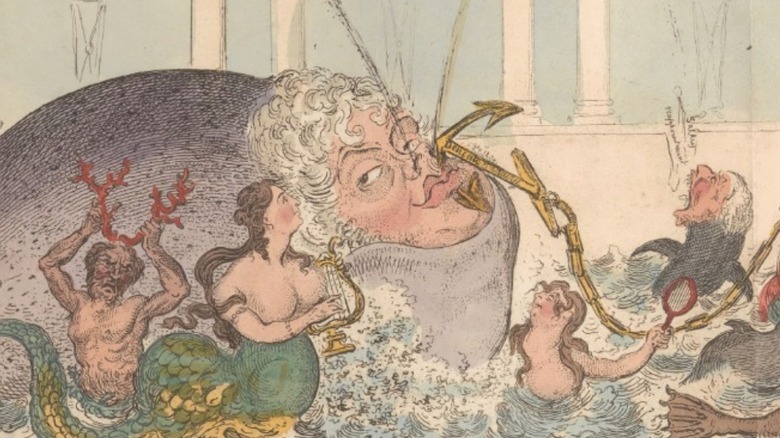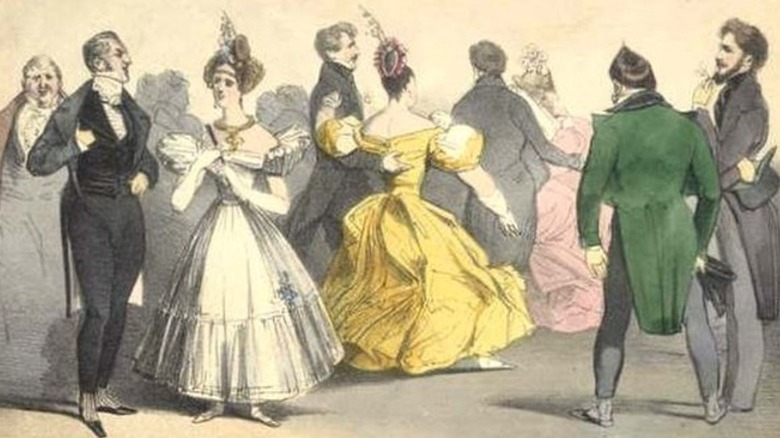Beau Brummell And King George IV's Relationship Could Not Survive A Joke
Everyone seems to love a good "rags-to-riches" narrative, but individuals who practice schadenfreude, the German word for taking pleasure in another person's misfortune, also enjoy a good "riches-to-rags" story, such as Beau Brummell's. Brummell (sometimes spelled Brummel), born in 1778, was a frequent patron of the many gentleman's clubs tucked away among London's cobbled back lanes and a prominent member of the "Dandy" movement, as Lord Byron referred to it. In his heyday, Brummell wielded so much power that his word alone could make or destroy anyone seeking entry into the exclusive world of fashion (via Encylopedia.com).
According to legend, Brummell spent five hours a day beautifying himself to perfection, even brushing his teeth on a daily basis, which was a remarkable effort, given English dental hygiene of the period. His quick wit and charisma garnered him the esteem of Lords and even the affection of the Prince of Wales, later to reign as George IV. These same words, however, would prove to be his undoing.
What goes up must come down, as we all know. Some fall from grace, while others dive in headfirst. In Brummell's case, a mixture of snobbery and obnoxiousness would gain him more ire than admirers. So much so, that an infamous quip upon being snubbed by the Prince Regent at a party would see Brummell gradually ostracized from high society. Yet, what could he have possibly said that would have got him canceled?
''Alvanley, Who's Your Fat Friend?''
George IV and Beau Brummell had a lengthy friendship dating back to their days in the same British military regiment. While Brummell's military career highlight was having his nose shattered by an irate horse (via ”The Life of George Brummell, esq., Commonly Called Beau Brummell"), he rose to captain merely because of the circles he ran in, which included the soon-to-be monarch of England, George IV. George, too, had a penchant for pageantry and a fondness for the finer things in life. When he died in 1830, he was riddled with gout and morbidly obese (per Historic UK).
It seemed George IV's weight made him literally and figuratively the elephant in the room. Cartoons of the period would often depict George IV as a whale seated at the table. Another dandy running in the same circles, Thomas Raikes, would remark about George, "[no man] was more unwilling to hear from those around him any hint or suspicion of his seeming decay" (via Brighton Museum).
The schism between these two old friends can be traced back to July 1813, when Brummell, George, and a slew of other society dandies attended an exclusive masquerade ball. When the Prince Regent approached them, Beau was with three other socialites. George IV is said to have acknowledged two of the men before walking away, dismissing Brummell and another friend. Upon this perceived slight, Brummell famously turned to Lord Alvanley and quipped, ”Alvanley, who's your fat friend?” This off-the-cuff remark resulted in Brummell becoming effectively ”canceled,” as a rift sprung up between the two former friends that would never truly heal (via ”Beau Brummell").
Neither a borrower nor a lender be
The crux of the matter is that Brummell's downfall began long before this remark. While Brummell inherited £30,000, or about £2.4 million in today's money, after his father's death, the truth was that he was squandering his inheritance on wanton spending on fancy dress and reckless gaming (per Britannica). Brummell began taking out loans he could never return to keep up appearances, not wanting to reveal the fact that he wasn't as wealthy as some of the people he desperately wanted to impress. After being outed to his peers by agitated creditors, and accruing debts of up to £16,000 (about £1 million in today's money) (via Bank of England), Brummell departed for Calais, France, in 1816, broke and fearful of debtor's jail.
Brummell was able to pull some threads, using his old contacts to get him a cushy position as a consulate in Caen in 1830 (via Britannica). However, Brummell, dissatisfied with the olive branch he had received, requested that the consulate appointment be rescinded in the hopes he'd be promoted elsewhere and able to re-climb the social ladder. This plan, however, backfired badly, as Brummell lost his comfortable position and was pushed back into poverty.
He was eventually sent to a debtor's prison in 1835. He was able to raise enough charitable donations to be released months later. Brummell, though, would be dead within five years. Impoverished and alone, made mad by syphilis, Brummell would pass away in 1840 (per English Heritage).


